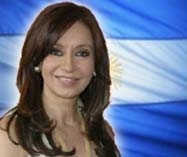Argentine government breaks off talks with agricultural producers
 Buenos Aires - The Argentine government said Monday it would not continue negotiating with agricultural producers in the face of recent criticism from their leaders of President Cristina Fernandez de Kirchner's policies.
Buenos Aires - The Argentine government said Monday it would not continue negotiating with agricultural producers in the face of recent criticism from their leaders of President Cristina Fernandez de Kirchner's policies.
Argentina's four agricultural federations organized a rally Sunday in Rosario, some 300 kilometres north of Buenos Aires, marking the Day of the May Revolution, which in 1810 began the country's independence from Spain.
During the rally of some 200,000 people, agricultural leaders warned that they would go back to protesting on Tuesday if there was no agreement with the government Monday.
This would be the third bout of protests since March, when an increase in export tariffs for soya and sunflower tied to the international market went into effect. The tariffs get higher as the international price of produce rises. For example, if the price of soya were to rise above 600 dollars a tonne, the state would claim almost all of the surplus.
On Sunday, agricultural leaders insisted that the government "correct" the tariffs. They also demanded measures to promote the production of milk products, meat, cereal and regional crops like sugar cane, grapes and cotton.
Government Chief of Staff Alberto Fernandez called the statements by agricultural leaders as "against any logic of dialogue."
"All the speeches had huge phrases, with tremendous concepts and the permanent idea that there is no chance to find a solution unless everyone does as rural producers want," Fernandez said.
"You cannot keep telling Argentines things that are not exact, even if your are defending a sector's interests. You cannot take away the legitimacy of someone who was elected six months ago," Chief of Staff Fernandez said, with reference to the president.
Argentine farmers have enjoyed prosperous years based on the increase in the price of foodstuffs on global markets.
The blockade of agricultural exports is very expensive for the Argentine government, since it draws a large part of its tax income from export tariffs. (dpa)